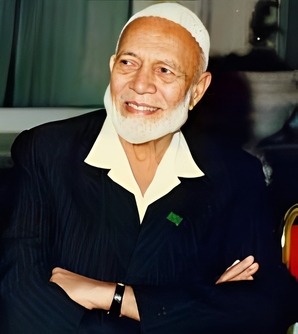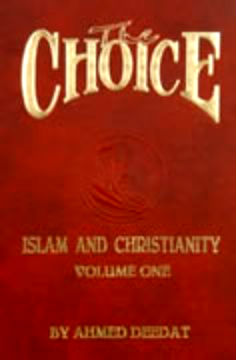Ahmed Deedat facts for kids
Quick facts for kids Sheikh Ahmed Deedat |
|
|---|---|
 |
|
| Religion | Islam |
| Denomination | Sunni |
| Personal | |
| Born | Ahmed Husein Deedat 1 July 1918 Tadkeshwar, British India |
| Died | 8 August 2005 (aged 87) Verulam, South Africa |
| Resting place | Verulam cemetery |
| Spouse | Hawa Deedat |
| Children | Yusuf Deedat |
| Parents |
|
| Religious career | |
| Profession |
|
| Influenced | Zakir Naik |
| Signature |  |
| Years active | 1942–1996 |
| Known for | Comparative religion |
Ahmed Husein Deedat (1918 – 2005) was a well-known Muslim speaker, writer, and thinker from South Africa. He taught himself a lot about different religions, especially Islam and Christianity. He became famous for holding public discussions with Christian speakers and giving talks about Islam, Christianity, and the Bible.
Deedat started an international Islamic organization called the IPCI. He also wrote many small books about Islam and Christianity that were shared widely. In 1986, he received the King Faisal International Prize for his 50 years of work sharing the message of Islam. He wrote and spoke mainly in English.
Contents
Early Life (1918–1942)
Ahmed Deedat was born in 1918 in a town called Tadkeshwar in what was then British India. His father moved to South Africa shortly after Ahmed was born. When Ahmed was nine years old, he left India to join his father in Kwazulu-Natal, South Africa. Sadly, his mother passed away just a few months after he arrived.
In South Africa, Ahmed worked very hard at school. He learned English, which was a new language for him, and did very well. He even skipped some grades! However, when he was 16, he had to leave school to start working because his family needed money.
In 1936, while working as a furniture salesman, Ahmed met some Christian missionaries. They were trying to share their faith with Muslims and often said that the Prophet Muhammad used force to spread Islam. These claims bothered Ahmed and made him very interested in learning about different religions. This is called comparative religion, where you study and compare the beliefs of various faiths.
Ahmed's interest grew even more when he found a book called Izhar ul-Haqq (which means Truth Revealed). He found it in his employer's basement while looking for something to read. This book talked about Christian missionaries in India a hundred years earlier. The book had a big impact on Ahmed. He then bought a Bible and started having discussions with trainee missionaries. Before, he couldn't answer their questions, but now he could.
He also started going to Islamic study classes taught by a local Muslim convert named Mr. Fairfax. When Mr. Fairfax offered an extra class on the Bible and how to talk to Christians about Islam, Ahmed was very keen. Soon, Mr. Fairfax had to leave, and Ahmed, who now knew a lot about the Bible, took over teaching the class for three years. Ahmed Deedat never had formal training as a Muslim scholar.
Early Work Sharing Islam (1942–1956)
Ahmed Deedat gave his first public talk in 1942. It was called "Muhammad: Messenger of Peace" and was given to about 15 people at a cinema in Durban.
A big part of Deedat's early work was leading "Guided Tours" of the Jumma Mosque in Durban. This large, beautiful mosque was a famous spot in Durban, a city popular with tourists. Deedat helped create a program that included meals, speeches, and free books. This gave many international tourists their first look at Islam. Deedat himself was one of the guides, welcoming visitors and introducing them to Islam and its connection with Christianity.
In 1949, Deedat moved to Karachi, Pakistan, with his family and lived there for three years.
IPCI and As-Salaam (1956–1986)
In 1957, Ahmed Deedat and two close friends, Gulam Husein Vanker and Tahir Rasul, started the Islamic Propagation Centre International (IPCI). Their goal was to print many books about Islam and offer classes for people who had recently become Muslim.
The next year, Deedat opened an Islamic school called As-Salaam Educational Institute. It was built on a large piece of land given as a gift. However, this project didn't work out as planned because the IPCI didn't have enough people or money. In 1973, another group, the Muslim Youth Movement of South Africa, took over the school. Deedat then went back to Durban and made the IPCI's activities bigger.
International Efforts (1985–1995)
By the early 1980s, Ahmed Deedat's work started to become known outside South Africa. His international fame grew in 1986 when he received the King Faisal Award. This award was for his great work in spreading the message of Islam, known as Dawah.
After receiving the award, Deedat, who was 66 years old, began traveling the world for ten years, giving talks. His trips included:
- Saudi Arabia and Egypt many times.
- The United Kingdom several times between 1985 and 1988, and Switzerland in 1987.
- Pakistan, where he met the country's leader, Zia al-Haq.
- The UAE and Maldives Islands in late 1987, where he was honored by President Maumoon Abdul Gayoom.
- The US in late 1986, where he had discussions and gave many talks.
- Sweden and Denmark in late 1991, where he had three debates.
- The US and Canada in 1994, with discussions in Canada and talks in Chicago.
- Australia in early 1996, which was his last tour before he became ill.
Illness and Death (1996–2005)
On May 3, 1996, Ahmed Deedat suffered a stroke. This left him unable to move his body from the neck down, and he could not speak or swallow. He was taken to a hospital in Riyadh, Saudi Arabia, where doctors said he was fully aware of everything around him. He learned to communicate by moving his eyes. He would form words and sentences by looking at letters on a chart as someone read them to him.
He spent the last nine years of his life at home in South Africa. His wife, Hawa Deedat, took care of him. Even though he was ill, he continued to encourage people to engage in Dawah (sharing the message of Islam). He received hundreds of letters from all over the world, and many people visited him to thank him for his work.
Ahmed Deedat passed away on August 8, 2005, at his home in Verulam, South Africa. He is buried in the Verulam cemetery. His wife, Hawa Deedat, passed away a year later in 2006.
Writings and Speeches
With money from countries in the Middle East, Deedat published and printed many small books. These books focused on important topics, and his many talks and discussions were often about these same ideas. Some of his main themes included:
- Is the Bible God's Word?
- What The Bible Says About Muhammad.
- Combat Kit Against Bible Thumpers.
- Crucifixion or Cruci-Fiction (about the story of Jesus' crucifixion)
- Muhammad: The Natural Successor to Christ.
- Christ in Islam
- Muhammad The Greatest.
- Al-Qur'an the Miracle of Miracles
One of his famous quotes is:
Islam will win with or without you. But without Islam, you will get lost and you will lose.
After he became popular in the Middle East and received the King Faisal Award, Deedat got money to print a collection of four of his popular booklets. This book was called The Choice: Islam and Christianity. The first 10,000 copies were printed in April 1993. This book became very popular in the 1990s and was often given away for free. Later, many more copies were printed, with 250,000 more copies made within two years.
Later, a second book called The Choice: Volume Two was published. It contained six more of Deedat's booklets. Deedat also helped promote a special printing of The Holy Qur'an Translation by Abdullah Yusuf Ali. This version included comments and a detailed index. It was sold at a low price to the public and was often mentioned in Deedat's speeches.
His Style
Ahmed Deedat had a special way of sharing the message of Islam. He didn't focus much on different Islamic groups or on creating an Islamic state. Instead, his main goal was to respond to Christian efforts to convert Muslims and to help Muslims understand and defend their faith against Christian arguments.
He became famous not just for his knowledge of Islamic teachings, but also for his deep understanding of the Bible. Many people who watched his videos or read his writings felt he helped them understand religious discussions better. His ability to speak English well, his skill in debating, and his knowledge of other religious texts made him popular with millions of people.
See Also
 In Spanish: Ahmed Deedat para niños
In Spanish: Ahmed Deedat para niños
- Dawah
- Islamic view of Jesus' death
- Swoon hypothesis
- Zakir Naik
 | Ernest Everett Just |
 | Mary Jackson |
 | Emmett Chappelle |
 | Marie Maynard Daly |


